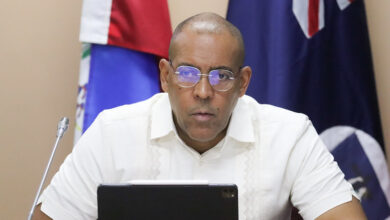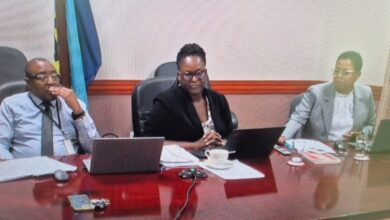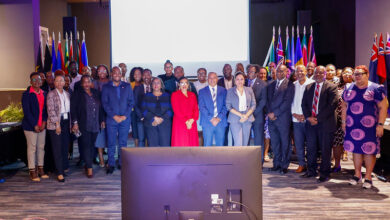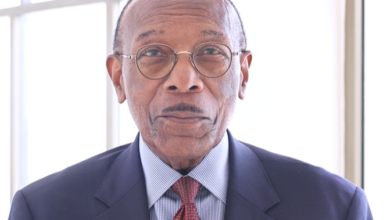Colleagues, ladies and gentlemen, there are many ongoing international, regional and domestic issues that will impact the work programme and the agenda of the Council. However, in the face of all these issues, the Council must find an appropriate mix of methodologies and strategies to address the ever expanding agenda of the Council.
I am pleased to note that the Rules of Procedures governing the operations of the Council will be discussed over the next two days. As Chair, it is my hope that we can finalize and approve the Rules which will greatly assist us in dealing with the long standing issues on our agenda, particularly those relating to non-compliance with provisions of the Revised Treaty and decisions of the COTED. I refer to the issues of market access for honey into Trinidad and Tobago and the intra-regional trade of frozen duck meat from Suriname.
Colleagues, if we are to seriously settle these long standing issues for the benefit of our respective private sector, we must consider the provisions of the Treaty outside of a Member State’s right to take those matters to the Caribbean Court of Justice (CCJ). I am reminded of an old adage, “it’s the private sector that trade, and we create the enabling environment and set policies”. Let us not therefore, create obstacles or prevent the free flow of trade between our respective countries.
Additionally, in reviewing our Rules of Procedure we must also consider other mechanisms in between meeting of the COTED that would bring resolution to the long-standing issues, as well as, treating with new and emerging issues on our agenda. Because of the dynamics of the matters to be addressed by this Council, we simply cannot wait to the regular meeting of the Council to be informed and take decisions. Therefore, an appropriate mechanism must be included in the Rules of the Procedure for the Council.
Nonetheless, perhaps the Secretariat can consider increasing the dissemination of technical briefs and updates on specific issues to be considered by the Council. This would certainly help with Member States preparation for meetings.
Colleagues, there are a number of other issues that will impact on our respective industries, which we must pay particular attention to. These include the impasse between the USA and China, reports of Turkish imports (particularly flour) into the region, and the importation of fake goods from various countries.
Geopolitical decisions are causing changes within the external trade and manufacturing environment, which will certainly have an impact on our industries and market. The Council must position itself to examine the real and potential impact of these matters, and take proactive, concrete steps to remedy them. Colleagues, we cannot afford to be reactive, our respective industries and businesses are depending on us to confront and deal with these issues in a decisive way.
Who else is best suited to safeguard our interest?
Recall that the Treaty mandates that this Council is responsible for the promotion, evaluation, establishment, and development of policies, programmes, and measures that protect and preserve our trading environment. Let us not hand this over to anyone, but work within the provisions of our Treaty, and other foreign and domestic relations to address these issues.
Colleagues, the Council must also keep a watching eye on the future of trade with the United Kingdom, post Brexit, which we will discuss during this meeting. As we work on the roll-over of the CARIFORUM-EU EPA, it is imperative that the Council continues to discuss the negotiating strategy and approach.
Equally, we need to also keep in focus the second five year review of the EPA Agreement, which comes up in 2020. Though not on the agenda for this meeting, I encourage each Member State to do their own stocktaking/analysis of the EPA. So that at the 47th regular meeting of the Council in November, we can have an agenda item that not only focus on the implementation of the EPA, but its challenges, opportunities and potential. We cannot afford any missed opportunities or slippage with our trading and other relations with the United Kingdom, and the EU.
Colleagues, I could not close these remarks without addressing matters relating to the implementation of the CARICOM Single Market and Economy (CSME), the review of the Common External Tariff (CET) and the extension of Article 164 treatment for sensitive industries of CARICOM Less Developed Countries (LDCs).
When we started this integration process, it was recognized by the framers that we are not equal and we will not all benefit the same from the CSME. It was for those reasons that the old Article 56 was replaced by Chapter Seven of the Treaty-Disadvantage Countries Regions and Sectors. The meeting will discuss the extension of Article 164 treatment for sensitive CARICOM LDC’s industries. The LDCs have done its own review of the performance of how the industries have benefitted from the protection provided by Article 164. The technical analysis submitted to this meeting by the LDCs analyses the trade performance, provides empirical data on the cost factors of production, and the accompanying mechanism to properly support Article 164. Colleagues, in our examination of this agenda item, we must remind ourselves of the past decisions of the Council regarding Article 164, and the genesis of said provisions. We must further consider what this provision of the Treaty affords to the industries of the LDC’s.
Our trading environment is rapidly changing and we must adjust, the review of the CET is a crucial response to that adjustment. As we take stock of the consultancy, let us also be reminded of the many requests for suspensions approved or denied by this Council over the years and the requests for changes to the Rules of Origin. The Council must remain focused on the review because of the likely changes that could be made to the CET. All Member States must remain engaged on the status of the consultancy.
Finally, Colleagues, Article 15 section 2 (b) confers on this Council the responsibility to, “promote the development and oversee the operations of the CSME”. As a region we are not where we want to be with the implementation of the CSME, and as we consider the sub items on the agenda we must do so in a manner to report and achieve progress going forward. Certainly, the confidence of our people and our businesses within the integration process must not be shattered.
We need to truly take stock of the areas of implementation where we have stagnated, devise and implement purpose fit solutions to achieve sustained progress, celebrate and showcase the achievements, and involve all community stakeholders in the CSME consultations, through all forms of dialogue at the national and regional level. We must recalibrate where we are with the implementation the Single Market, and the Single Economy, if we are to achieve that desired vision of sustained economic prosperity of our region.
Colleagues, ladies and gentlemen, I pray that we have a productive and progressive meeting.






